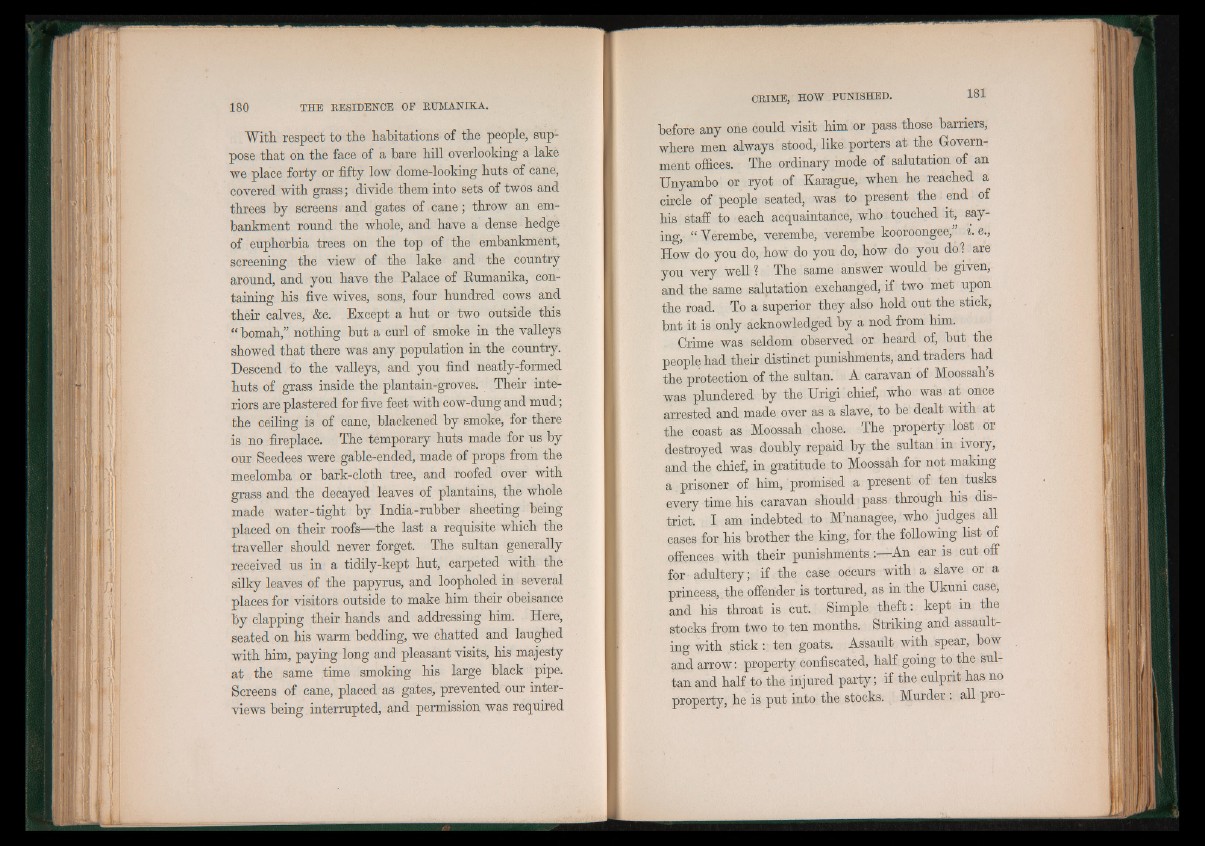
With respect to the habitations of the people, suppose
that on the face of a bare hill overlooking a lake
we place forty or fifty low dome-looking huts of cane,
covered with grass; divide them into sets of twos and
threes by screens and gates of cane; throw an embankment
round the whole, and have a dense hedge
of euphorbia trees on the top of the embankment,
screening the view of the lake and the country
around, and you have the Palace of Rumanika, containing
his five wives, sons, four hundred cows and
their calves, &c. Except a hut or two outside this
“ bomah,” nothing but a curl of smoke in the valleys
showed that there was any population in the country.
Descend to the valleys, and you find neatly-formed
huts of grass inside the plantain-groves. Their interiors
are plastered for five feet with cow-dung and mud;
the ceiling is of cane, blackened by smoke, for there
is no fireplace. The temporary huts made for us by
our Seedees were gable-ended, made of props from the
meelomba or bark-cloth tree, and roofed over with
grass and the decayed leaves of plantains, the whole
made water-tight by India-rubber sheeting being
placed on their roofs—the last a requisite which the
traveller should never forget. The sultan generally
received us in a tidily-kept hut, carpeted with the
silky leaves of the papyrus, and loopholed in several
places for visitors outside to make him their obeisance
by clapping their hands and addressing him. Here,
seated on his warm bedding, we chatted and laughed
with him, paying long and pleasant visits, his majesty
at the same time smoking his large black pipe.
Screens of cane, placed as gates, prevented our interviews
being interrupted, and permission was required
CRIME, HOW PUNISHED. 181
before any one could visit him or pass those barriers,
where men always stood, like porters at the Government
offices. The ordinary mode of salutation of an
Unyambo or ryot of Karague, when he reached a
circle of people seated, was to present the end of
his staff to each acquaintance, who touched it, saying,
“ Yerembe, verembe, verembe kooroongee, i. e.,
How do you do, how do you do, how do you do? are
you very well ? The same answer would be given,
and the same salutation exchanged, if two met upon
the road. To a superior they also hold out the stick,
bnt it is only acknowledged by a nod from him.
Crime was seldom observed or heard of, but the
people had their distinct punishments, and traders had.
the protection of the sultan. A caravan of Moossah’s
was plundered by the Urigi' chief, who was at once
arrested and made over as a slave, to be dealt with at
the coast as Moossah chose. The property lost or
destroyed was doubly repaid by the sultan in ivory,
and the chief, in gratitude to Moossah for not making
a prisoner of him, promised a present of ten tusks
every time his caravan should pass through his district.
I am indebted to M’nanagee, who judges all
cases for his brother the king, for the following fist of
offences with their puni shment s .An ear is cut off
for adultery; if the case occurs with a slave or a
princess, the offender is tortured, as in the Ukuni case,
and his throat is cut. Simple theft: kept m the
stocks from two to ten months. Striking and assaulting
with stick: ten goats. Assault with spear, bow
and arrow: property confiscated, half going to the sultan
and half to the injured party; if the culprit has no
property, he is put into the stocks. Murder . all pro